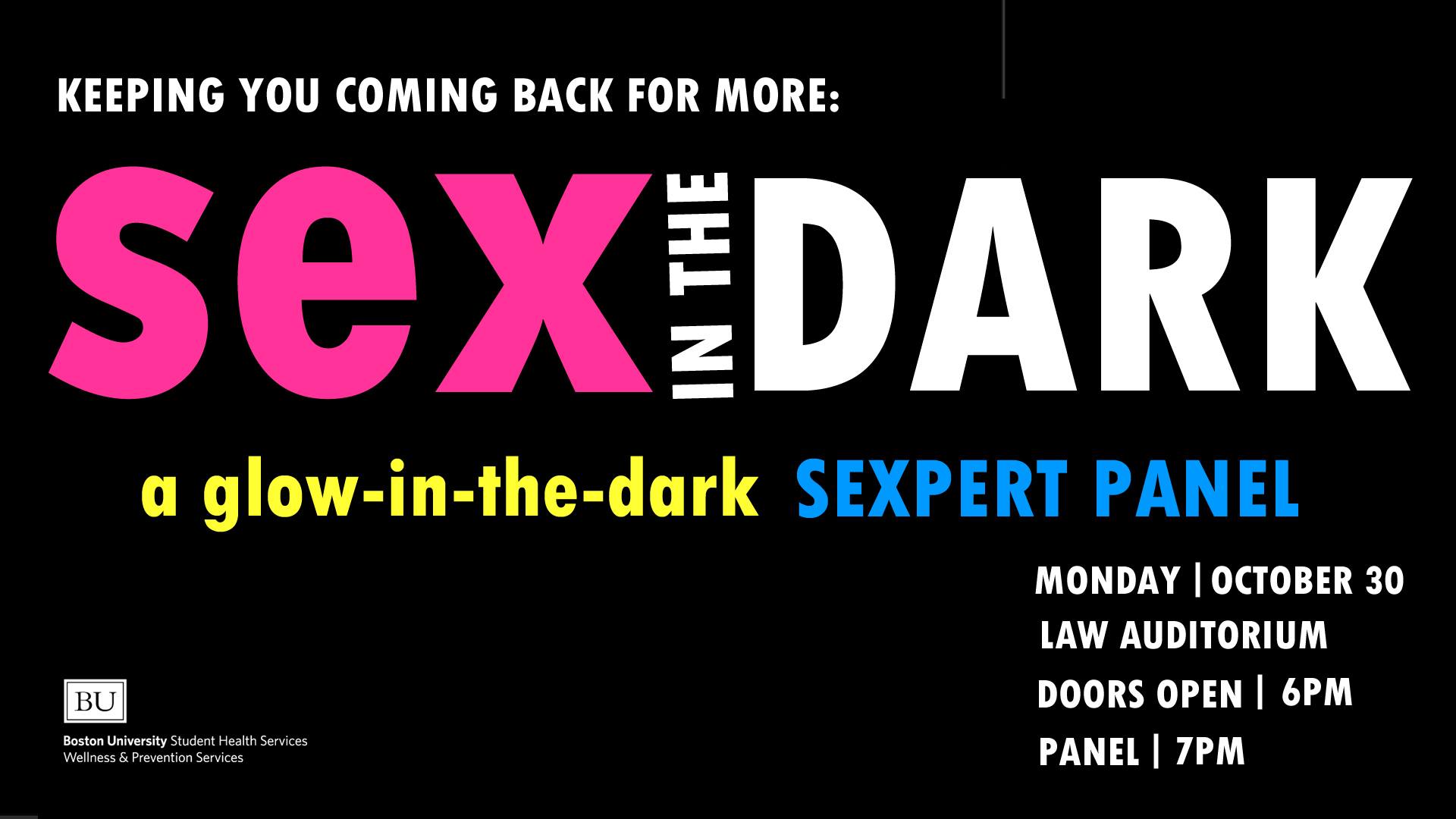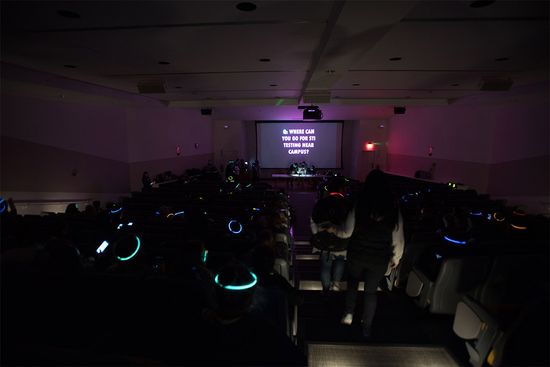Everything You Wanted to Know about Sex, but Were Afraid to Ask
Annual Sex in the Dark event a chance to submit questions anonymously

A panel of BU community experts will offer advice and information at the Wellness and Prevention Services annual Sex in the Dark event tonight.
Ever had a question about sex, but were too embarrassed to ask? Here’s your chance. Tonight, BU Student Health Services (SHS) Wellness & Prevention hosts its annual Sex in the Dark event, where students can anonymously ask questions about sexual health and relationships and get answers from BU community experts.
Billed as “the hottest Q&A on campus,” discussions and questions are expected to touch on subjects ranging from safe sex practices and contraception to sexual pleasure, communication and consent, sexually transmitted diseases, sexual identity, and more.
Organizers say the goal is to create a sex-positive campus culture by providing medically accurate and student-friendly health information as well as to let students know about the campus and community resources available to them.
Sex in the Dark starts at 7 p.m. but students are urged to arrive early so they have time to write their questions, since the auditorium lights will be off once the Q&A begins. Neon giveaways, such as bracelets, necklaces, and eyeglasses, will be handed out in advance and will provide some illumination. The panelists will address as many questions as possible during the 90-minute event.
The event’s Resource Fair begins at 6 p.m., another reason to arrive early. Students can stop by tables with info from a variety of on- and off-campus organizations, including the BU Center for Gender, Sexuality & Activism, BU’s Sexual Assault Response and Prevention Center (SARP), and Good Clean Love.
This year’s panelists are SARP crisis intervention counselor Nathan Brewer, SHS nurse practitioner Teri Aronowitz, Lola-Ade Akintobi, from the Massachusetts Department of Public Health, and Sawyer Bethel, the interim executive director of OUT MetroWest, a nonprofit that supports the LGBTQ community.
“I think it’s a great opportunity to get answers to questions we don’t normally ask,” says Brewer. “Oftentimes in our culture we shy away from difficult conversations, from conversations around sex, sexuality. Oftentimes there’s shame or guilt around what we either know or don’t know or the questions we want answered, so this really gives a great opportunity to ask those questions without having to identify yourself, without having your name attached to the question.”

Much of the information students get from media is out of context, Brewer notes. He hopes that being able to have questions answered in the proper context will provide them with more accurate information.
The need for panels like this one, participants say, is crucial. “We don’t have a national coordinated sex education program like they do in the Netherlands,” says Aronowitz, “and in some countries it’s not possible to talk about these things.”
In her own work, Aronowitz says, she’s found that some students are naive about basic anatomy and sexual information. She wants students to be shame-free when it comes to their sexuality and to walk away from tonight’s Sex in the Dark with a positive perspective.
A 2017 report from the nonprofit Guttmacher Institute found that only 55 percent of males age 15 to 19 and 60 percent of females age 15 to 19 have received formal instruction about birth control and that fewer than 5 percent of LGBTQ students age 13 to 21 reported that their health classes included positive representations of LGBTQ-related topics.
Panelists say that tonight’s event is designed to help even those students who believe they’re already well versed in sexuality. “Even if someone thinks they might know everything there is to know,” says Bethel, “I believe that being around other folks asking questions can get your mind working in a different way, to the point where new thoughts and questions can arise.”
Bethel says that talking openly about consent and body politics can be especially difficult for young people who might be questioning their own identity and/or sexuality, and hopes that panels like this will help students to feel more empowered about their own identity.
During breaks in the Q&A, SARP student ambassadors will be putting on skits covering topics like how to ask for consent, how to be a prosocial bystander (prosocial behavior is any action intended to help others), and how to respond to someone sharing something difficult for them to talk about.
Since its debut six years ago, Sex in the Dark has become extremely popular. Program evaluations show that 87 percent of students say they feel more informed about their sexual health after attending, 85 percent say they are better prepared to talk about sexual issues with a partner, and 82 percent say they are more comfortable accessing sexual health resources on campus.
Sex in the Dark: A Glow-in-the-Dark Sexpert Panel is tonight, Monday, October 30, from 7 to 9 p.m. in the School of Law Auditorium, 765 Commonwealth Ave. Doors open at 6 p.m., and students can visit various tables to learn about sexual health resources on and off campus and get glow in the dark giveaways like bracelets, necklaces, and eyeglasses. The event is free and open to BU students, faculty, and staff.
Alex Peña can be reached at alexgp97@bu.edu.
Comments & Discussion
Boston University moderates comments to facilitate an informed, substantive, civil conversation. Abusive, profane, self-promotional, misleading, incoherent or off-topic comments will be rejected. Moderators are staffed during regular business hours (EST) and can only accept comments written in English. Statistics or facts must include a citation or a link to the citation.